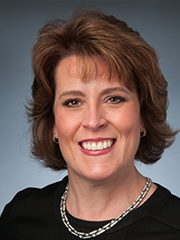
Between 1946 and 1964, about 72.5 million Americans were born. The generation was dubbed the baby boomers due to the spike in births during that time period.
Members of that generation are now enjoying retirement or are on the cusp of it. As they age, they will begin to pass their assets to their children and heirs, some of whom are members of the millennial generation.
This unprecedented event has been dubbed “the Great Wealth Transfer,” and by the year 2061, it is estimated that $59 trillion will be passed down from boomers to their beneficiaries.
Mary Ellen Hancock, CFP, vice president and senior wealth strategist at PNC Wealth Management®, took the time to answer questions about the Great Wealth Transfer and how to plan for it.
Q: In your words, can you define the Great Wealth Transfer?
Hancock: We have an aging baby boomer population. Many of them are in their late 50s to early 70s. They will soon need to pass down their assets to the next generation, most likely millennials.
Older millennials are now in their mid- to late- 30s, and many of them could be inheriting money or property as a result of the Great Wealth Transfer.
This impacts both the boomers who will be passing down assets, as well as the millennials and beneficiaries that will be receiving them.
Q: Does this require planning?
Hancock: Absolutely. This transfer of wealth will happen regardless of whether boomers and millennials plan for it, but without planning, it could go awry.
First, the money could be subject to significant taxes. Second, if you are a beneficiary, you need to be prepared to receive this money, and may want to consider guidelines so that you don’t mishandle it.
Q: If you expect to pass down money or inherit money, how do you start planning?
Hancock: If you expect to pass down money, it’s important to start thinking about this now, especially if you are a parent on the threshold of retirement.
The first thing to do is to talk as a family, preferably with qualified financial advisors present. These can be sticky, uncomfortable conversations, but the last thing you want is for your children or heirs to be on different pages when the money is transferred.
It’s worth noting that there is no one-size-fits-all strategy to plan for a wealth transfer. If you don’t already have one, build a team of advisors who can help you customize a plan based on your family’s assets, goals and timeframe, among other factors.
Q: What are some of the strategies that will help families prepare for the Great Wealth Transfer?
Hancock: As I mentioned earlier, regardless of whether you have a lot or a little to pass down, it makes sense to meet with a financial advisor and get a plan in place.
The advisor will likely conduct a cash flow analysis to see what type of income the boomers will have in retirement, as well as their daily expenses. If there isn’t enough income to fund those expenses and to leave a little left over, the financial advisor can help make adjustments.
No one wants to be a burden on their adult children, so it’s important that you aim to have enough money to fund your retirement. You also will want to confirm you have proper life insurance.
Another thing that needs to be completed is a will. Even if you created a will many years ago, don’t think of it as something you already checked off your to-do list. If your will is not current, it’s time to review and update it. What’s especially important is to confirm that you still have a relationship with the person you named as executor of your will. Oftentimes, people will name an executor of their will decades before they die, and may either have a falling out or the person may be deceased or unable to serve in the executor role of the will down the road.
Lastly, it may be considered a bit morbid, but some people choose to prepay for their funerals. That way, their beneficiaries don’t have to worry about paying for funeral expenses.
Q: What are common mistakes people involved in a wealth transfer should be aware of?
Hancock: Beneficiaries can walk away with a little or a lot of money, but it is a mistake to not have a plan in place for the assets. One of the best decisions they can make is to pay off student loans or other debts with the money they receive. The sooner you can get out of debt, the better.
For the boomers who are passing their money down, a common mistake is believing that any money remaining in their qualified retirement plan (401(k), IRA, etc.) will be passed down according to their will. In fact, all that matters is the beneficiary designations within the plans themselves.
It’s crucial that people update their beneficiaries when they change jobs, get married, have children or get divorced. I can’t tell you how many people I’ve seen go through a divorce and get remarried but forget to update their beneficiary. If that person passes away, their ex-spouse will get all of their hard-earned assets.
Q: What is your best advice to boomers and recipients ahead of any kind of wealth transfer?
Hancock: Start the conversation now, be honest and get educated. Have thorough conversations with your family members and financial advisors. It might be uncomfortable, but I promise it will be worth it in the end.

Sometimes an inheritance can cause conflict among heirs. Hancock recommends that parents never discuss one sibling’s financial situation with another. They also should use their financial advisors as intermediaries to resolve conflicts.












